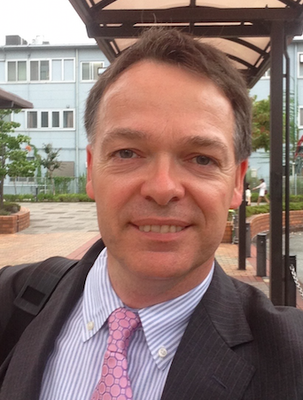
Archive copy.
International Conference 2018
Featured Session
Understanding and Increasing the Role of Fluency in EFL
.
Complexity, Accuracy, and Fluency (CAF) were first introduced as measurable constructs indicating linguistic gains. Researchers agree on definitions of accuracy and complexity, yet there are many interpretations of fluency. For Exploring EFL Fluency in Asia (Palgrave, 2014), we decided that each author should define fluency from their own perspective. I will start by introducing a range of fluency definitions found in our book, and then address the vital role that fluency has in teaching.
In too many Asian classrooms, the Grammar-Translation approach focuses on accuracy and complexity at the expense of fluency. Therefore, I teach my students the concepts of a balanced approach to CAF, input/output, and the four skills. Initially focusing on fluency offers a wide entry point for greater student engagement – everyone has opinions if the teacher praises output efforts rather than perfect grammar. I will share ways I integrate a fluency approach within the four skills.
____________________
Invited Second Session
Expressing One’s Skill Set Fluently
.
Liberal arts programs espouse the merits of developing students with a well-rounded set of skills. Throughout eight years working in a department of international studies (IS) with a one-year study abroad component, I saw students engaging with IS contents who were expected to acquire life-long skills such as critical thinking, communication abilities, problem-solving, leadership, and positive attitudes that would be beneficial to their lives, their careers, and to society as well.
Unfortunately, to whatever degree universities are succeeding with these curriculum goals, too many students lack self-awareness, and do not know how to package and present what they have learned from their study abroad experience or from their classes in university. In my 18-month seminar course, “Exploring Leadership,” we invested a great deal of time exploring and packaging lessons learned over four years of university life. This presentation will share examples and results from that exploratory process.
____________________
Biographical Sketch
.
Steven Herder has been an EFL professional for almost 30 years, teaching from elementary school to the university level, and is now an associate professor at Kyoto Notre Dame University in Japan. He leads students in the Global English Course, as well as in his 3rd/4th-year Women in Leadership seminar.
He is also an author and editor of two Palgrave Macmillan teacher resources, Innovating EFL Teaching in Asia (2012) and Exploring EFL Fluency in Asia (2014). Since 2010, he has been working with Suken Publishing on the high school textbook series Big Dipper Series I, II, III; and DUALSCOPE II, as well as writing teacher manuals, drill textbooks, and graded readers.
In 2012, he co-founded the International Teacher Development Institute (iTDi; http://itdi.pro), an online teacher training community for teachers by teachers, with over 5000 members and a global reach into over 100 countries. Steven believes, “Being a teacher means a never-ending commitment to learning.” Email: herder@notredame.ac.jp
_____________________
Steven Herder Resources on the Web
.
Steven Herder Website: essays, philosiphy, research, blogging
https://jarinefl.wordpress.com/
JALT Member's Profile: Steven Herder
https://www.jalt-publications.org/tlt/departments/showcase-members-profi...



